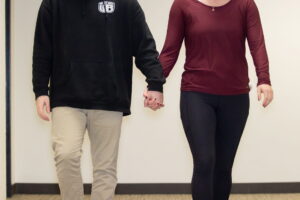Tag: Olivia Bretzman ’22
Tangents & Tirades
by Andrea Traietti on February 6, 2020
Opinion
Cherishing Our Grandparents
Over break, many students spent most of their time with family. After all, what is break for, if not that? While this may not ring true for all, many were able to connect with their grandparents over holiday meals or perhaps meet with an elderly relative or friend.
Whether family or not, one thing these amazing people hold is experience and sage advice. In college, we often think we know everything or are invincible. Reality strikes, and we realize, we are far from that. We have not yet lived.
For this reason, grandparents and the elderly in general can be a fountain of knowledge, advice, and pure love. If one thinks about it, they might have gone through school, perhaps raised a family, overcome an illness, lost a loved one, or fought in a war. Maybe they have lived a seemingly simple life! One thing they all have in common is the fact that they made mistakes. They learned.
While we meditate in our time of maturation and learning, we can glean so much from these amazing people. If anything, give them a call this semester, if they know how to use their cell phones, and ask them about their lives. Listen. Learn. Show a little love.
—Olivia Bretzman ’22

Embracing Diversity in Education
Regardless of major, every student at Providence College has to fulfill certain core requirements. Oftentimes, students would rather take another class for their major or something fun and easy, but fulfilling the core proficiencies can make us more well-rounded human beings.
The diversity proficiency is especially important. Courses that fulfill this requirement can be found across a multitude of departments, including English, women and gender studies, and American studies, to name a few.
The diversity proficiency is much more than a throwaway requirement; it teaches us topics that we are familiar with through a focused and unique point of view. Classes that fulfill this requirement celebrate our differences and highlight them thoroughly.
PC is a Catholic institution that is not considered especially diverse, andthis proficiency is certainly a step toward understanding the significance of different cultures in the history of humankind.
The diversity requirement can attempt to connect our learning from classes like Development of Western Civilization to the rest of the world.
Recently, DWC as a whole has been making strides towards including lectures and texts from cultures that are not considered traditionally western. This evolution of the course and an appreciation for embracing the diversity requirement can make the College a more welcoming and accepting environment.
—Julia McCoy ’22
Plants in Dorms
When decorating dorm rooms, students try to make them as homey as possible by adding family pictures and items with special meanings. But lately, plants have become a common item in many dorm rooms.
A frequent issue with many plants, however, is that they tend to attract insects. This can cause problems for students where insects might take over their whole room or even the building. Because of this, we need to be mindful about which plants we bring into our dorm buildings.
Succulents are a popular trend because they are very low maintenance, but students should start to consider other low maintenance plants that have many positive health benefits, for example, the ZZ plant.
A ZZ plant can hold water in its stems for weeks at a time and can thrive in any lighting that you place it under. This plant also releases oxygen into the air which can help improve sleep.
This is the perfect plant for students who do not have much time to care for a plant but like the aesthetic appeal of a plant in their room. Plants are important to have in a college dorm because they boost morale and help increase productivity, but with the issue of insects, doing some research might be useful to help lower that possibility.
—Erin Garvey ’22

The Midwest is More Than “Flyover Land”: Putting an End to Harmful Stereotypes of Non-New England Areas
by The Cowl Editor on November 14, 2019
Campus

by Olivia Bretzman ’22
Opinion Staff
Yes, there are beautiful mountains in New England. Here lies the ocean, four seasons, the Patriots, and much more. Surprising to some, though, this country holds far more than just New England. In fact, New England is a mere sliver of the United States.
The majority of Providence College students hail from New England, and on a broader scale, the East Coast. There is nothing wrong with that. In fact, it largely defines PC’s culture. However, many fail to realize, or are simply ignorant of, the rest of the student body and where they are from.
Think about it. Where one grows up has a large impact on them. It explains a lot about them, but is also not everything. One is not defined by where they are from, yet it is still a very important part of them.
These stereotypes, while not powered by malice, can perpetuate a very negative connotation towards a place. Thus, the propensity of the stereotypes here on our campus about different parts of the country, or even the world, is stunning and surprising, considering our intelligent student body.
The evidence lies in what students and faculty alike comment after the infamous “where are you from?” that haunts every single sort of social gathering or event. From experience, when someone responds with a state or place not in New England or on the East Coast in general, the questioner is first taken aback by this information.
Second, their response typically comes out negatively or almost accusatory. For example, “Where even is that?” or “What do you even do there?” or “Why on earth did you come here?!”
Immediately, the foreign place or state becomes a point of debate and a defining characteristic of that person.
A multitude of stereotypes follow their response. For whatever reason, a majority of students believe the South to be filled with extremist conservatives with a bad school system, the Midwest to be “flyover land,” and the West Coast, well, its hipster vibes and coastline are just not up to par to the East.
These stereotypes, while not powered by malice, can perpetuate a very negative connotation towards a place. While this perhaps does not directly affect a person, it indirectly affects a vital part of that person: where they are from.
Quite frankly, the rest of the United States is beautiful and offers so many unique things not found in New England. Quite specifically, the Midwest, of which many students cannot even correctly explain the geography, is a wonderful example of this.
Many believe it to be a prairie wasteland of sorts. Furthermore, it apparently is undeveloped besides the farms where everyone rides a tractor to school. Granted, that does actually happen in some places, but that stereotype illuminates an extremely small portion of people in the Midwest.
In fact, the Midwest contains a plethora of natural beauty such as the Great Lakes, the boundary waters, and more.
Plus, it holds some of the most metropolitan and international cities such as Chicago and Minneapolis.
This simply illustrates how convoluted our views are. Honestly, this stretches so far beyond the smaller picture of stereotypes. In broader terms, it almost suggests an ignorance or blindness to the surrounding world, which can most definitely have an impact on one’s capacity to learn and live in the future.
Ultimately, it is important to try and live with an open mind about everyone one meets, everywhere they travel, and every stereotype they encounter. The world is filled to the brim with diverse people, places, and experiences, and deserves to be looked at with as curious an eye we can give it.
Apply this to more than just meeting fellow students, but also to traveling in general, and especially to studying abroad! Many students study abroad with preconceived notions about everything. What truly lies in their experiences surprises many and proves just how easily persuaded we are to believe what others tell us or what we read online.
In all reality, New England is lovely. It offers so many wonderful things including the people and places. Its natural beauty is unique and its cities are truly built up into bustling and exciting metropolitan kingdoms.
However, we must stay on our guard as to not hone in solely on New England as the only fantastic portion of a much bigger country. Stereotypes are truly detrimental, and if one follows them narrowly, they will miss out. After all, Tom Brady is not even from New England.
The Death of Dating: Hook-up Culture is a Relational Crisis
by The Cowl Editor on October 31, 2019
Opinion

by Olivia Bretzman ’22
Opinion Staff
Dating is dead. Literally. The Instagram account @barstoolpc recently posted a video of a freshman in his own “relationship funeral march.” The caption of the video reads, “When your boy gets into a relationship in the first month of college.” A large parade of Guzman Hall residents follow this procession down the hall as the victim laughs off the situation.
While humorous, this post suggests a negative outlook on dating at Providence College: the death of dating. The idea of a casual date has faded, and on every college campus, hook-up culture has become an “easy-out” from genuine relationships. A plethora of societal, moral, and personal factors have shifted the dating culture from a dinner to a Tinder meetup.
The first factors that have revolutionized dating are secularization and social media, which ultimately go hand in hand. Apps such as Tinder, Bumble, and Snapchat allow an ease of connection and have one ultimate goal: a hook-up. Allyson Giso ’22 comments, “What is making the first move? Our culture has redefined this via social media.” Now, instead of asking for a number and then proceeding to ask someone on a date, people use apps to contact someone in the least social way possible with no repercussions.
Hardly any genuine interactions occur. Paul Gondreau, professor of theology, commented on societal norms of technology, stating, “Everybody texts, of course, which too often allows people to turn to text messaging as a crutch that masks insecurities and awkwardness that come with interpersonal communication.” Many turn to their phones as a way to avoid intimate situations, including dating.
He continues, claiming that our generation has “too little interpersonal and emotional connection in a hook-up crazed culture.” As a professor on campus, Dr. Gondreau sees these interactions firsthand. Our generation has shifted so drastically from his, which focused on casual dating and legitimate admiration for other human beings.
Secondly, our idea of commitment is completely skewed. Chris Daly ’22 comments on this lack of commitment, stating, “Cheating has become normalized to the point where people just don’t really care.” Our culture creates an art out of cheating by regularly displaying unfaithful interactions in media. Similarly, divorce has become a norm, leading to the fear of separation in every relationship.
Along with the detriment of divorce, anxiety and depression rates have skyrocketed due to hook-up culture. Many worry that dating will cause emotional trauma, leading to trust issues and fragile mental health. Allie Eurell ’22 comments on the emotional state of dating, claiming, “Even if you have known a guy for a while, you assume you will not date because that would be too emotional. Someone assumes they will get hurt.” Ultimately, this generation is scared. Scared of getting attached, of becoming reliant, of giving up a good job and future for another person.
One of the last issues our campus struggles with is peer judgement. Many do not want to date because of their reputation. There is an idea that no one should date until junior year when one can start thinking seriously about their future, alluding to marriage or serious endeavors.
There is a huge stigma in the male population, especially in the freshman and sophomore class about dating. They regard each other as “soft” if they ask someone out. Aidan Schifano ’22 comments on this generalization, stating that many say that if you are in a serious relationship, “you’re just whipped and you can’t hang out with the boys.” Supposedly, when dating someone, even casually, their significant other will have no time for anyone or anything else.
In the Accinno Hall bathrooms, #Bringdatingback posters line the stalls and doors. These posters illustrate the idea that dating is “not as awkward as it seems.” Various colleges and universities have joined together to support this effort to normalize dating again.
In fact, Dr. Gondreau challenges his students to bring dating culture back in his theology of marriage class. He offers incentives for them to take someone on a date off-campus without physical contact besides a hug. The results are very telling. He states, “Last semester I took a poll in my theology of marriage class: all of my students thought I should require the students in my marriage class to ask a person on campus out on a date! What does that tell you?” While daunting, many have actually experienced positive outcomes with this task.
Quite frankly, our societal norms and technology have altered the beauty of casual dating into a serious and negative topic; however, only our generation has the power to change this quasi-stigmatized viewpoint. We can do this with a simple date.
Tangents & Tirades
by The Cowl Editor on October 3, 2019
Opinion
Intramurals to Club: Where is the Middle Ground?
Looking to get more involved on campus in the excitement of the new school year? Maybe pick up a sport you dropped after high school? Students are often encouraged to join club or intramural teams, but it is not that simple.
The gap between club and intramural sports here at Providence College is keeping both the experienced from playing at a competitive level and the inexperienced from trying something new without risking injury.
Committing to playing a club sport includes tryouts, off-season training, weekly traveling to compete against other schools, and national tournaments. PC has even recruited high school athletes for their club programs. As club sports reflect the characteristics of Division I athletics more and more, I cannot help but be skeptical of the level down, intramurals.
In contrast, intramural teams are formed based on sign-ups and are granted only a handful of games in the span of their short-lived seasons. Perfect for the freshman who is looking to try something new, but not for the four-season-high-school-varsity-athlete who would rather spend weekends with their friends than travel hours for away games.
How will this gap be bridged? It seems out of reach for the former high school athlete to continue their hobby without sacrificing all of their time as this gap between intramurals and club sports widens. For me, I’ll stick with The Cowl.
—Margaret Scales ’23

SodexNo
Providence College’s dining service, Sodexo, has taken a lot of heat lately. People simply do not like the food and have issues with its variety. There is no shortage of complaints on campus about PC’s food options and its quality. Aside from all this, one thing is clear: Sodexo is not a reliable nor healthy food service.
First off, the menus posted online are not always true to what is actually being served. Many students claim they have gone to Raymond Dining Hall on a particular day due to the meal advertised on the menu. Upon arrival, they realize Ray is definitely not serving what they claimed. Simultaneously, they lose a meal swipe, and their appetite.
Secondly, healthy options are sparse in both Alumni and Ray unless you would like to pay. True, there is the salad bar in Ray; however, a healthy, balanced, and quality meal expands far beyond “leaves, seeds, and twigs,” as my friends lovingly refer to the protein-deficient salads they eat daily. Plus, the Alumni salad bar, which is hardly better in content, requires Friarbucks or real money. Ultimately, serving high-carb, unhealthy meals such as burgers, pizza, and chicken patties does not make sense.
Considering the knowledgeable and health-conscience society we live in, as well as our tuition, the dining services here are a mystery.
—Olivia Bretzman ’22

